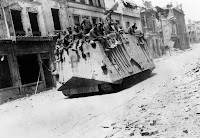As the world commemorates the 75th anniversary of VJ Day and the end of the Second World War, this blog pays tribute to those who risked - and in many cases gave - their lives for global liberty. I for one am thankful, even if the British Broadcasting Corporation is not.
Mandalay
By the old Moulmein Pagoda, lookin' lazy at the sea,
There's a Burma girl a-settin', and I know she thinks o' me;
For the wind is in the palm-trees, and the temple-bells they say:
"Come you back, you British soldier; come you back to Mandalay!"
Come you back to Mandalay,
Where the old Flotilla lay:
Can't you 'ear their paddles chunkin' from Rangoon to Mandalay?
On the road to Mandalay,
Where the flyin'-fishes play,
An' the dawn comes up like thunder outer China 'crost the Bay!
'Er petticoat was yaller an' 'er
little cap was green,
An' 'er name was Supi-yaw-lat - jes' the same as Theebaw's Queen,
An' I seed her first a-smokin' of a whackin' white cheroot,
An' a-wastin' Christian kisses on an 'eathen idol's foot:
Bloomin' idol made o' mud
Wot they called the Great Gawd Budd
Plucky lot she cared for idols when I kissed 'er where she stud!
On the road to Mandalay,
Where the flyin'-fishes play,
An' the dawn comes up like thunder outer China
'crost the Bay!
When the mist was on the rice-fields
an' the sun was droppin' slow,
She'd git 'er little banjo an' she'd sing "Kulla-lo-lo!"
With 'er arm upon my shoulder an' 'er cheek agin my cheek
We useter watch the steamers an' the hathis pilin' teak.
Elephints a-pilin' teak
In the sludgy, squdgy creek,
Where the silence 'ung that 'eavy you was 'arf afraid to speak!
On the road to Mandalay,
Where the flyin'-fishes play,
An' the dawn comes up like thunder outer China
'crost the Bay!
But that's all shove be'ind me - long
ago an' fur away
An' there ain't no 'busses runnin' from the Bank to Mandalay;
An' I'm learnin' 'ere in London what the ten-year soldier tells:
"If you've 'eard the East a-callin', you won't never 'eed naught
else."
No! you won't 'eed nothin' else
But them spicy garlic smells,
An' the sunshine an' the palm-trees an' the tinkly temple-bells;
On the road to Mandalay,
Where the flyin'-fishes play,
An' the dawn comes up like thunder outer China 'crost the Bay!
I am sick o' wastin' leather on these
gritty pavin'-stones,
An' the blasted English drizzle wakes the fever in my bones;
Tho' I walks with fifty 'ousemaids outer Chelsea to the Strand,
An' they talks a lot o' lovin', but wot do they understand?
Beefy face an' grubby 'and -
Law! wot do they understand?
I've a neater, sweeter maiden in a cleaner, greener land!
On the road to Mandalay,
Where the flyin'-fishes play,
An' the dawn comes up like thunder outer China
'crost the Bay!
Ship me somewheres east of
Suez, where the best is like the worst,
Where there aren't no Ten Commandments an' a man can raise a thirst;
For the temple-bells are callin', an' it's there that I would be
By the old Moulmein Pagoda, looking lazy at the sea;
On the road to Mandalay,
Where the old Flotilla lay,
With our sick beneath the awnings when we went to Mandalay!
On the road to Mandalay,
Where the flyin'-fishes play,
An' the dawn comes up like thunder outer China 'crost the Bay!
Rudyard Kipling



















.png)

